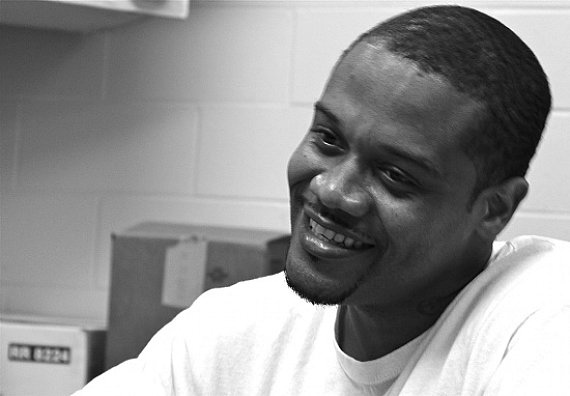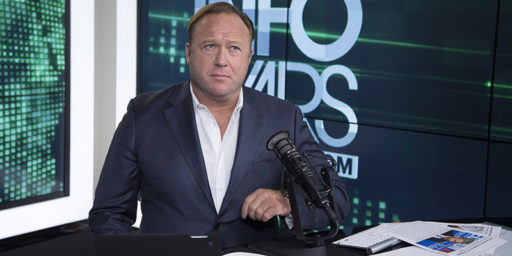Mississippi Death Row Inmate Cory Maye To Be Freed, Thanks To Radley Balko
Cory Maye has spent ten years on death row after a trial tainted by racism and corruption. In a few days, he will be free.
Within the next few days, Cory Maye, who has spent the last ten years on Mississippi’s death row after a murder conviction tainted by racism and the testimony of a corrupt and incompetent medical examiner, will be set free:
After 10 years of incarceration, and seven years after a jury sentenced him to die, 30-year-old Cory Maye will soon be going home. Mississippi Circuit Court Judge Prentiss Harrell signed a plea agreement Friday morning in which Maye pled guilty to manslaughter for the 2001 death of Prentiss, Mississippi, police officer Ron Jones, Jr.
Per the agreement, Harrell then sentenced Maye to 10 years in prison, time he has now already served. Maye will be taken to Rankin County, Mississippi, for processing and some procedural work. He is expected to be released within days.
Radley Balko, formerly with Reason and now writing for The Huffington Post has been writing about Maye’s case for several years now, and in the process has uncovered a harrowing tale
Shortly after midnight on December 26, 2001, Maye, then 21, was drifting off to sleep in his Prentiss duplex as the television blared in the background. Hours earlier, he had put his 18-month-old-daughter to sleep. He was soon awoken by the sounds of armed men attempting to break into his home. In the confusion, he fired three bullets from the handgun he kept in his nightstand.
As he’d later testify in court, Maye realized within seconds that he’d just shot a cop. A team of police officers from the area had received a tip from an informant — later revealed to be a racist drug addict — that there was a drug dealer living in the small yellow duplex on Mary Street. It now seems clear that the police were after Jamie Smith, who lived on the other side of the duplex, not Maye or his live-in girlfriend Chenteal Longino. Neither Maye nor Longino had a criminal record. Their names weren’t on the search warrants.
Maye would later testify that as soon as he realized the armed men in his home were police, he surrendered and put up his hands. There were three bullets still left in his gun. But Maye had just shot a cop. And not just any cop. He shot Officer Ron Jones, Jr., the son of Prentiss Police Chief Ron Jones, Sr. Maye is black; Jones was white. And this was Jefferson Davis County, a part of Mississippi still divided by tense relations between races. Maye was arrested and charged with capital murder, the intentional killing of a police officer.
After a long series of delays, Maye was finally tried in 2004 in Marion County, Mississippi. Maye’s family shied away from retaining Bob Evans, the Prentiss public defender, a decision they’d later come to regret. Instead, they pooled their money and hired Ronda Cooper, an attorney in Jackson who made a number of critical mistakes during Maye’s trial. There were other problems with Maye’s trial as well, including testimony from Mississippi medical examiner Steven Hayne, who performed the autopsy on Jones. I’d later report on a number of questions about Hayne’s workload and credibility as an expert witness. He eventually resigned from the National Association of Medical Examiners and was barred from doing any more autopsies for Mississippi prosecutors.
While he was at Reason, Balko put together a web documentary about the case and the problems with the investigation, the trial, and the testimony of the medical examiner:
Maye himself released an Open Letter through Balko:
I realize a lot of people are going to wonder why I accepted a plea. We just felt that regardless of the facts and evidence that pointed in my favor, there was the possibility that one or more jurors could not see it my way, causing a mistrial. That could leave me sitting here another nine months or more, or longer if it keeps repeating that way.
This is Mississippi, and some people refuse to let go of their old ways from the old days. I just didn’t want to put my family through any more heartache, and didn’t want to have to wait any longer. It was take a chance of a mistrial, or grab hold of my future and be the man/father/friend that I can be, and that my family loves and misses.
I’ll forever be grateful to all the friends and supporters that have been with me throughout all of this. I thank God daily because it’s good to know this world we live in can have many wonderful & caring people in it. I consider myself blessed to know you all are out there. I’ll forever be in your debt. Thanks a million, and may we continue to stay in touch.
Love,
Cory J. Maye
The Maye case revealed many of the problems that still exist in our criminal justice system, especially in places like rural Mississippi. A court appointed counsel system that puts Defendants at the mercy of underpaid, over-worked, and not always competent attorneys, racial bias, and “expert” witnesses who aren’t really experts at all and yet end up having significant influence over a jury. Additionally, the Maye case brings home in stark reality many of the problems with the “no-knock” style police raid that have become all too common and, all too often, have ended in tragedy. It also brings home, as Gene Healy noted several months ago, the case also points out the tragedy that is the War On (Some) Drugs:
If any good can come out of the Maye case, perhaps it can draw attention to the larger issues surrounding the War on Drugs. That war has, as Radley has documented, increasingly shifted from metaphor to reality. And as paramilitary policing tactics and the warrior mindset have infected law enforcement at all levels, the bodies have mounted. Cory Maye could have been-may still become-collateral damage in that war.
This case is also yet another reason why I oppose the death penalty. But for some good post-trial legal work, and an investigative reporter who gave a crap, Cory Maye could be dead right now.







I totally concur on the death penalty. It’s kind of pointless to debate on the principle, when the practice is so demonstrably flawed.
This would never have happened if Maye had had the sense to be an influential Frenchman.
Add cop to the list of jobs that should not be given to anyone who volunteers to be one.
Cop on civilian violence is getting out of hand.
No matter where you stand on the moral issue of the Death Penalty…the system is too flawed. How many innocent people have we killed in the name of Justice? Some people think every life is precious…but their concern and compassion starts at conception and ends at birth.
MR,
Disagree totally, I mean like Tano said justice in America is administered fairly whether you’re a poor black man from Mississippi or a rich white frenchman.
/snark
@michael reynolds: Well, yes…and to quote fictional lawyer Ron Trott: “If you have the right lawyer, this is the best criminal justice system in the world.”
Except in this case it looks like the right lawyer was the public defender
I slink in shame against Mr. Balko for he work that he’s done.
He’s a Lincoln Steffens journalist and I’m not.
@Janis Gore: I think Balko’s work is a mixed bag. His “journalism” would be much better if it wasn’t so ideological, but in this case, the mix of ideology and journalism wasn’t a bad thing.
I doubt that any of us want to go to death without good reasons.
Americans have made their opinion clear in repeated polls; better one hundred innocent men get the death penalty than one guilty man keep breathing.
Why does Radly Balko hate America and love criminals? Why does he have a strange, foreign sounding name? I think he might be a Muslim.
@Loviatar:
You are a liar. I said no such thing.
@michael reynolds:
I think you are right. No one would have spent the time trying to make the case that he was wrongly convicted. The consensus that he must be guilty would have formed early, and been unshakable.
If the Founding Fathers could have seen today’s crop of Americans…they probably wouldn’t have bothered.
Americans have reverted to the mean.
@Tano: The difference being, of course, that the influential frenchman won’t be going to prison. Let’s keep in mind that of the 270 people exhonerated by the Innocence Project, 70% have been minorities.
Being white continues to have significant advantages.
Yes, I know Ben. I bet that my feelings about this issue are the same as most people here. We all wish both that on the macro level, the judicial system were perfectly fair and just. And on the individual case level, that justice is done in every case.
A core principle that most everyone accepts, and that is built into our legal system, is the notion that judgements about guilt or innocence should only be made after a fair and thorough hearing of both sides of a case. In the legal system, this is formalized as “innocent till proven guilty”, with the right of a trial by ones peers, and a whole host of rules that support the principle. On a personal level, I know that I always try to approach these public cases in a similar way – I put myself in the position of a juror, and I basically accept as a default position that the person is not guilty, unless the evidence compels me to conclude otherwise – and that only after I have heard the other side’s arguments.
I have no idea of DSK is guilty or not. If he is, then he should rot in jail. The version of evidence that we originally saw was pretty strong, though we never heard his side of the story, so I reserved judgement. The news of the past few days makes the evidence against him a lot weaker. I still am reserving judgement, even more so than before.
I’ve got into this argument mainly because quite a few people ’round here, including some whose opinions I usually respect, seem to have jumped to a conclusion and now seem to downplay the new information as a way of defending their conclusion. I don’t understand the need to do that.
No doubt, minorities suffer injustice far more than privileged people in our judicial system. That is not an excuse to act unjustly toward any particular person who may happen not to be a member of a historically oppressed group.
@Tano:
Nice Strawman;
Who said anything about the need to “act unjustly toward any particular person who may happen not to be a member of a historically oppressed group.” What was said and what is continuing to be said is don’t underplay the impact money, race and influence had on how quickly DSK was able to get “justice”.
Your original posts in the other thread made quite clear that you believed DSK “got off” because there was a lack of evidence or because the accuser had a questionable background. Starting with Michael Reynolds, people pointed while that may be true; without his money, his influence and being America probably his race he got much better justice that a poor black man would get with the same accusations.
Then along comes the Cory Maye case to reinforce the perceptions of those who are not naive or willfully denying reality. Poor black man from Mississippi defending his home from intruders kills a white man and is sentenced to die. His justice comes about through volunteer work from a libertarian blogger and some law students. His justice comes about after being put on death row and after serving 10 years in jail and after missing the first 10 birthdays of the daughter he was trying to protect that night.
Yeah, that justice equates to DSK’s 60 days house arrest in a posh apartment in Manhattan. How could I have not seen the equivalency.
/snark
On the other hand, there are cases like Joseph Druce, a guy already serving life without parole who freely murdered another prisoner, secure in the knowledge that the state of Massachusetts couldn’t impose any more penalties on him because they have no death penalty. Instead, he was “rewarded” with daily trips out of prison for weeks while he was indicted, tried, and convicted for a second first-degree murder — and then given a second sentence of life without parole.
Without a death penalty, there’s no incentive for those already serving life without parole to not kill again within a prison. Druce’s victim was a pedophile priest, but it could have been a guard or someone less sympathetic than John Geoghan.
There has to be some way we can keep the death penalty for cases where it is truly called for, and to serve as a final deterrent, while doing what we can to prevent cases like Maye’s.
J.
To keep the discussion from careening away from reality; statistics show that it’s the race of the victim that is important in these things. He killed a cop; it’s basic tribalism after that.
@Loviatar:
Its not that people said that some people should be treated unjustly, it is that they just went ahead and did it. Many people here have assumed that DSK is guilty – the minute they heard the charges. They didn’t wait to study the accusation to see if it were plausible, or to delve at least a little bit into the question of whether the accuser was believable, let alone wait to hear his side of the story.
I have no more sympathy toward fat, rich, obnoxious Frenchmen than anyone else – but that does not mean that I am going to assume their guilt the minute anyone charges them with a crime. The question has been raised as to what would have happened if DSK were a poor black man, and the woman in the hotel a rich white woman. Aside from how the judicial system might have acted differently, I suspect that a lot of people around here would have reacted differently also. They would have resisted the unseemly rush to convict the accused, and waited to see what all the evidence amounted to.
So I wonder what motivates their attitude. On a personal level, why would someone rigorously defend the presumption of innocence for some people, but leap to assume the guilt of others? All I am doing in this argument is trying to apply to DSK the same attitude that I do to any other defendant – including the one that I was called upon to pass judgement on as a juror.
And Michael and these others are simply wrong about that. As I pointed out several times. DSK “got off” because the prosecutors discovered that the “victim” was constantly lying. This happened in the course of a routine investigation. There was nothing about DSK’s wealth that influenced that process. It was not DSK’s fancy lawyers who dug up dirt on this woman.
I am not denying for a moment that if this case had gone forward as it seemed originally that it would, that DSK would have used all resources at his disposal to win his freedom. And the result would have been a massively better defense effort that a poor defendant, black or white, could get from his public defender. But there is no evidence whatsoever that these factors were at play in this case.
We hear, from time to time, about outrageous instances of injustice in the American judicial system, and there are more of them happening to poor black people than privileged white people. But we do not hear about cases where poor black people are accused of a crime, then the charge is dismissed because the “victim” is found to be a liar. Those cases may happen every day, and would never be mentioned by the news media.
There is a logical fallacy at work here – that because poor black people suffer injustice disproportionately in the system as a whole, that there is something to be complained about in any particular case where a white person gets proper treatment. Also a fallacy would be the conclusion that in that particular case, the defendant would necessarily have been treated unjustly if they were black.
Not every black person who is arrested is treated unfairly. Nor is every white person given special consideration. You cannot accuse me of denying that injustice happens simply because I fail to see it working in any one particular case.
Anyway, I think you owe me an apology for your earlier post where you blatantly misrepresented what I said.
@Jay-Tea:
While sympathetic to the specifics of the case you mention, it seems to me to be the exception that you use to try to prove a rule. Calling “day trips” to court a reward – even if sarcastic – is just plain dumb and suggests you don’t have much experience with court proceedure. It might be a change of scenery, but it no vacation.
But the bigger problem is always the underlying question I have about conservative support forthwith death penalty – why is it that the people who most loudly proclaim how the government can’t get anything right are typically the same folks who most consistently support empowering the government with the power to execute it own citizens?
“He killed a cop; it’s basic tribalism after that.”
The son of the sheriff.
Is anyone arguing that having money typically isn’t a factor in being properly defended in court? In this case its interesting that the public defender would have been the better choice, but that’s not typical – most public defenders are extremely overworked, and don’t have the time to prepare properly for every case.
The DSK case is odd too, in that it was the prosecution that turned up the evidence that the accuser lied – I wonder if DSK can get a refund from his lawyers, since it doesn’t appear they did much.
Its very arguable that if DSK wasn’t rich that the prosecution would never have examined the accuser’s claims, and an overworked public defender might not have either. And that’s why groups like the innocence project are vital.
Every reporter has his biases/ideology. There is nothing wrong with that in and of itself. When it is a problem is when you don’t know the reporters ideology and it influences his writing. You do not get that with Balko because you know without a doubt what his ideology is and can factor it in when reading his work.
@george
I just think it would be nice to look at the facts of each case and see what we can draw out from them, rather than re-pronounce preconceived beliefs that don’t necessarily bear on this story. It doesn’t appear to be a public defender issue. It looks to me like Maye’s problems were:
1. He committed murder as defined by MS law. At that time MS law did not recognize the Castle defense; it’s been changed since then and today he would have been able to argue that he was justified in defending himself in his own home.
2. Corrupt/crooked forensic pathologist. We can devise fairly good systems to cover most circumstances, but they will fail when key players act in criminal or unprofessional ways.
3. Inexperienced death penalty counsel. She screwed up the mitigation phase of the trial big time, but frankly most people here wouldn’t be happy if she was successful at it and got her client life.